Xiu Xiu Albums From Worst To Best
Jamie Stewart was applying to become an airport baggage handler the day his father, a musician and record producer, committed suicide. Stewart never finished the application; instead, he threw himself wholeheartedly into performing left-of-center pop music with his newly minted outfit Xiu Xiu. Named for the titular character in a bleak Chinese film about a woman who is sent into the countryside, only to suffer a series of tragedies ultimately leading her toward death, Xiu Xiu’s immediate focus was on an equally bleak depiction of Stewart’s twisted family history. As a self-loathing bisexual nihilist with a dark and dandy sense of humor, the LA native had a lot to say about awkward human encounters of all stripes. His examination of gender and queer politics became another tier of the truths the band attempted to dramatize — sometimes comically, others tragically, but often a sick combination of the two.
Prior to Xiu Xiu, Stewart had played in a band called Ten In The Swear Jar, a jazzy experimental pop outfit that, in its eclectic zeal, laid the groundwork for Xiu Xiu’s outré approach to song arrangements. As Xiu Xiu evolved, they would take a more electronic tack even as they reworked XITSJ’s best songs. Gradually, dissonant noise would be the only sonic element that could match the aggressive nature of Stewart’s confrontational lyrics, his singing style singular, but inspired by idiosyncratic crooners like Morrissey, Ian Curtis, Nina Simone, Scott Walker, and Diamanda Galas.
With its tense subject matter, wildly experimental musical style, and Stewart’s unmistakable voice, Xiu Xiu became the sort of band that most people would find off-putting — but for those with whom they resonated, Xiu Xiu became cultish figures, unlike anything else in the annals of music history. Stewart has been Xiu Xiu’s only constant member, but a rotating cast of regular collaborators like Angela Seo, Cory McCulloch, Ches Smith, Greg Saunier, and Caralee McElroy have formed a chosen musical family around him, a prolific replacement for the dysfunctional one he was born into. For a while, Xiu Xiu put out at least one album (and usually an EP, as well) a year, on numerous labels. 15 years into their career, that amounts to some 19 LPs that include cover songs, collaborative efforts with Italian post-rock bands and Japanese noise artists, and most recently, an album that suggests leaving the history of the band behind and starting with a blank slate and a fresh perspective: the indomitably catchy FORGET, which was released a few weeks ago.
Of course, remembering where Xiu Xiu have been is an important part of appreciating their latest effort, so we’re ranking their discography from worst to best. That’s tricky for a band whose best work is usually painful to listen to. Xiu Xiu operate within their own set of standards. And making listeners uncomfortable, either through sonic dissonance, dark subject matter, or both, is one of the band’s hallmarks. Maybe that’s why pitting Xiu Xiu albums against one another makes more sense than evaluating the band in the context of music as a whole. As it turns out, Xiu Xiu’s bleakness is more like a balm to the band’s fervent following — their grim outlook is born of realism, reflective of the idea that beauty isn’t always in sunshine and roses. Rather, a more poignant version of it awaits in the turmoil and atrocities we face, if only we’re willing to look it directly in the eyes.
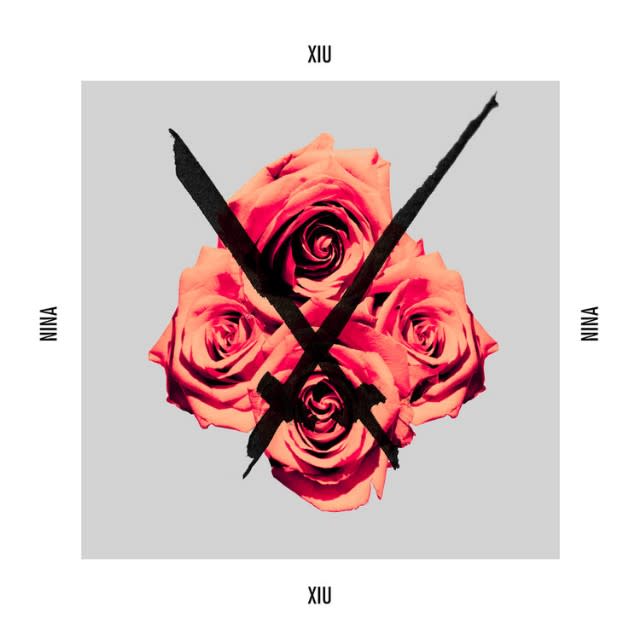
19. Nina (2013)
Covers have long been an important part of Xiu Xiu’s discography — they appear here and there on a handful of proper releases and are always at least a little thrilling because no matter how faithful they are to the originals, Stewart’s tortured vocals bring out an entrancing brand of pain that’s hard to look away from. Even Xiu Xiu’s cover of Rihanna’s “Only Girl (In the World),” with its distorted, maniacal strings, felt like a completely authentic examination of gender role reversal, which has defined Stewart’s songwriting from the beginning. In 2006, Xiu Xiu released a five-song EP called Tu Mi Piaci (which translates to “I like you”) that featured covers from acts as wide-ranging as the Pussycat Dolls and Bauhaus, and it opened with a woozy version of Nina Simone’s “He Needs Me,” which felt like a natural choice for Stewart’s unironic idolatry.
But seven years later, Stewart decided to take that hero worship much further and it proved to be a disaster — overindulgent even by his usual standards. Reinterpreting a pretty respectable scope of Simone’s standards with free-jazz arrangements wasn’t the worst approach to take, but Nina unfortunately doesn’t improve on the jazz singer’s catalogue. Wheezing along in fits and starts, the instrumentation tumbles clumsily behind Stewart’s truly awful approximation of Simone’s smoky register. It seems as though it would’ve been just as easy for Stewart to sing these songs as he might have any Xiu Xiu song, with his own well-worn idiosyncrasies adding bizarre color to the fresh renditions. Instead, he whispers and hisses and bleeds any soul whatsoever out of these songs. “Four Women,” for instance, could’ve been a striking success given Stewart’s confrontational handling of racial stereotypes and sexual abuse on past releases, but he buries the song’s political gestures in a cacophonous, messy tangle. Most of the record drags along, and while “See Line Woman” has a little brightness and energy, it still doesn’t compare to Simone’s take on the schoolyard chant, nor does the ensemble’s prog-rock rendition of “You’d Be So Nice.” All the elements of a transcendent collection should have been here, but this album does little to satisfy fans of either Xiu Xiu or Nina Simone, and its avant-garde jazz elements, barely rising to a boil, won’t excite fans of that genre, either.

18. Merzxiu (Merzbow And Jamie Stewart) (2015)
It certainly makes sense that Jamie Stewart would want to work with prolific noise pioneer Masami Akita — under the moniker Merzbow (as well as in his dozens of side projects), Akita cooks up an abrasive stew of grinding electronic squall that saws at the eardrums and makes an interesting footnote to Xiu Xiu’s harsher experimentation. Add to that a kindred preoccupation with Japanese porn, BDSM culture, and making art from junk, and it seems Stewart and Akita would never run out of things to talk about. But with a soundscape this impenetrable, no dialogue can really be heard, and Merzxiu is nothing short of an onslaught in which the hallmarks of any Xiu Xiu album are mostly erased.
Born out of a collaborative live improvisation at New York art and music venue Le Poisson Rouge that may very well have been thrilling, the Record Store Day release, limited to 1000 copies, is a brutal, tinnitus-inducing 37 minutes of wordless, staticky dissonance more in line with Akita’s vision than Stewart’s. Xiu Xiu tend to use noise most effectively when it’s an exclamation point, letting it burst out of a lull in a song only to fade out again or accentuate one of Stewart’s particularly frantic outbursts. Here, it is a run-on sentence with tones blurring together with nary an accent on anything. Its deafening textures don’t feel particularly inspired, and given that Akita has produced some 400 recordings of this nature, there’s little to indicate that this exercise pushed either artists’ boundaries in any clear direction. The biggest challenge is for the listener — tasked with finding some redeeming idea within it.

17. Düde (2012)
Düde is the third (and most recent) installment of an off-and-on collaboration with an Italian post-rock band called Larsen. The side project tapped into some interesting ideas with its first two releases in 2005 and 2007, but by 2012 it seems the improvisational venture had run out steam, and it’s a bit puzzling as to why either act wanted to revisit it. The best metaphor for the varying success of XXL’s three releases is Düde’s three-song “Film Me In The Laundry” suite: the first part, like 2005’s ¡Ciaütistico!, is nostalgic and warm; its second movement, like 2007’s ¿Spicchiology?, is mysterious and slightly darker. But “Film Me In The Laundry #3,” much like this album as a whole, feels superfluous and half-baked. From the noncommittal synth-blizzard of “Apsorbtion” to the wanky, 19-minute Krautrock grind of “Oi! Düde!” there isn’t much to latch onto. Perhaps it’s a question of chemistry — by this time, Angela Seo had replaced Caralee McElroy in Xiu Xiu. The latter featured heavily in the previous two XXL releases, and Seo’s main offering here is some disaffected spoken-word Korean over the sparse bells and guitar arrangement of “Krampus.” Stewart’s only vocal appearance comes on the last track, “Vaire,” a synth-heavy composition that comes too little, too late after so much useless meandering. If Xiu Xiu and Larsen wanted to bounce more ideas off one another, that’s fine, but any of these snippets could’ve used more development and some re-tweaking safely back in either band’s wheelhouse rather than warranting this release.
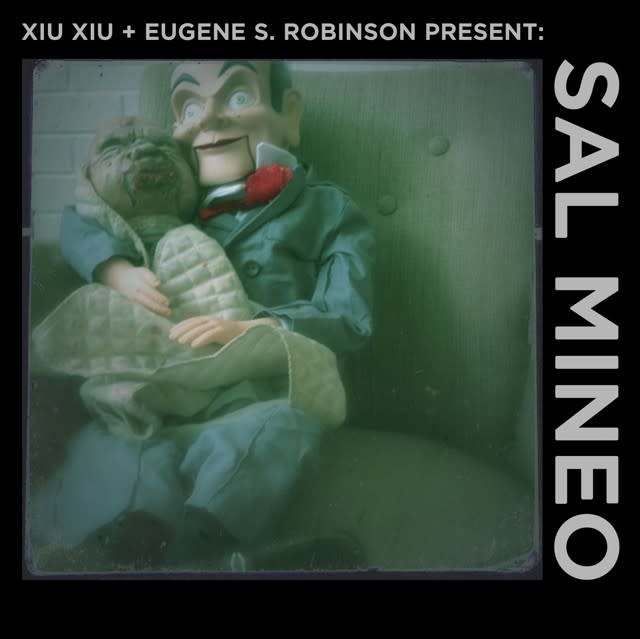
16. Xiu Xiu And Eugene S. Robinson Present: Sal Mineo (2013)
It is not surprising that a record whose muse was a misunderstood, racially ambiguous, bisexual, out-of-work actor stabbed to death in a Los Angeles alleyway would be jarring, strained, and dark. Other than the dire mood of the thing and the name of the project, there isn’t much in the way of biographical specifics to link this collaboration to the Rebel Without A Cause supporting actor, only that it is a meditation on the stinging, sour taste of success followed by unredeemable failure.
The things that made Sal Mineo (the actor) a cult icon have, in their turn, been factors in the attention paid to both Stewart and his cohort in Sal Mineo (the band), Eugene S. Robinson. Robinson’s main claim to notoriety is as the aggressive frontman of Oakland noise rock act Oxbow, though he’s also the author of a noir novel and non-fiction book about organized fighting. Vocally, Robinson and Stewart’s approaches are similar, which is to say, unflinchingly confrontational; Robinson’s more muscular, huskier voice hovers a few registers lower, although, like Stewart, he’s known to howl and moan in the midst of a bone-chilling whisper.
The record was made long-distance, while Stewart lived in North Carolina and Robinson was on the West Coast, with Stewart providing the drone, feedback, and effects, and Robinson writing and singing all the lyrics. Though it was performed live during a brief tour of Europe, the whole project unfortunately feels like a wasted opportunity for the two to do whatever version of vocal harmonizing they might’ve come up with. Rather than sending the recording out into the world after Robinson had added his words to Stewart’s experimental racket, these 24 vignettes could’ve been brought to a much fuller potential if, say, Stewart had then layered in his contrasting but similar vocal presence, at least on some of the tracks. Most of them hover around the one-minute mark, begging the question of whether they were really very complete at all. Presents Sal Mineo is an interesting comparison of Stewart, Robinson, and Mineo himself, but it’s a shame that it requires such mental acrobatics on the part of the listener to get there.

15. The Air Force (2006)
Though its title hints at the possibility of military evisceration not heard since “Support Our Troops OH!” and the tortured saint that graces the cover suggests a critique of religious martyrdom, The Air Force doesn’t really deliver on those promises. Instead, there are subtle references to yellow ribbons in “Bishop, CA,” named for a town whose fast and loose environmental policies, much like Harlan County’s, wreaked havoc on its economy and its townsfolk. There are casual mentions of boys slipping in blood and lost youth. But these snapshots are symptomatic of a greater portrait of stasis — the general suspended animation of an America permanently embroiled in Middle Eastern conflict, sure — but perhaps more telling, a relatively calm period for Xiu Xiu and the band’s members.
The songs on The Air Force are gorgeously produced by Greg Saunier of Deerhoof, his first crack at bringing Xiu Xiu’s sonic vision to life. From sparse, tender numbers like the piano-driven “Buzz Saw” to the hushed tones of “Watermelon Vs. The Pineapple” and the arcing strings over a gentle electronic pulse of “The Fox & The Rabbit,” every moment feels more reserved than a typical Xiu Xiu record, which no doubt came as a relief to some. Still a far cry from a pop record, this is as straightforward as Xiu Xiu get, with the churning guitars, chirping electro flourishes, and sunny flute of “Boy Soprano” and the overtly cutesy Caralee McElroy-led “Hello From Eau Claire” reaching oddly playful heights for the band. Later, on “P.J. In The Streets Of London,” Stewart once again returns to a rumination on his father’s suicide (not to mention makes a Smiths reference), its twanging guitar an obvious call-out to “I Luv The Valley OH!” The album ends with “Wig Master,” a semi-grotesque ode to BDSM adapted from a piece of writing by sporadic Xiu Xiu bass player Devin Hoff, so, yes, this is still the same band, but it is ultimately a neutered version of it — its pain performed rather than authentically felt. For some, that peace comes on like a fresh breath, but for those who relish Xiu Xiu’s more outré moments, The Air Force isn’t forceful enough.
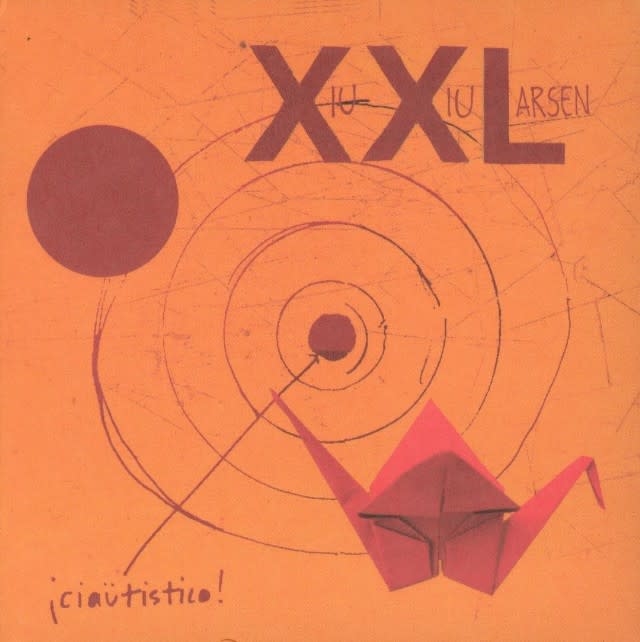
14. ¡Ciaütistico! (2005)
The first of a trans-Atlantic collaboration between Xiu Xiu and post-rockers Larsen, ¡Ciaütistico! has an ease to it that presents interesting musical ideas without the overburdened emotionality of a typical Xiu Xiu record. It uses mostly instrumental experimentation to deliver a view slightly askew, with the Italians pushing Stewart and McElroy toward a fuller sound. It was both a literal and figurative vacation for Xiu Xiu, who recorded the improvised session in Larsen’s Torino studio and, naturally, it offers proof that Stewart is perhaps not so tortured or preoccupied by trauma unless he’s focusing on it as a way to scare Xiu Xiu fans. What’s most telling is that its title is a joke, making light of Stewart’s anti-social and obsessive tendencies, translating to a pun on the phrase “Goodbye (ciao) Autism!” Even “Sundays,” the seven-minute-long closing number (which opens with digitally manipulated bong rips), moves along at a clip, more focused than its jam-sesh origins would suggest. The record’s three vocal tracks — opener “Paw Paw Paw Paw Paw Paw Paw,” “(Pokey In Your) Gnocchi,” and “Prince Charming” — have a timed-release effect that draws anyone in from zoning out too completely and appeases those yearning for Stewart’s pained croon, although here it appears tempered. The singer is less in a prison of his own making than he is, well, on holiday.
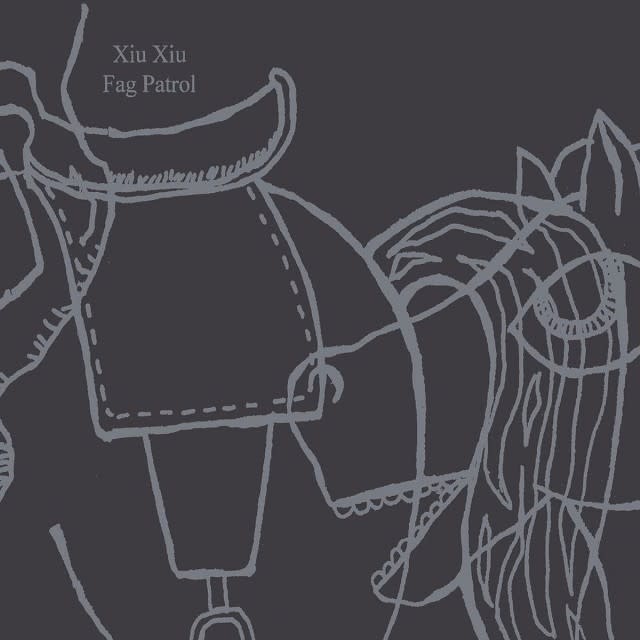
13. Fag Patrol (2003, Compilation)
Xiu Xiu’s earliest records functioned as something of an affront, the caustic packaging like a warning not to get too close. Diametrically opposite, the hushed acoustic tones of Fag Patrol — eight mostly acoustic versions of tracks that all appeared on other Xiu Xiu or Ten In The Swear Jar releases, plus a gently strummed cover of the Smiths’ suicide daydream “Asleep” — are almost meditative. The main issue with it is that none of these stripped-down retreads improve much on their former or future iterations, though it did provide an interesting stop-gap for those still acclimating themselves to Stewart’s singular tenor early in the game. The indignant “This is the worst vacation ever!” yowl on “I Broke Up,” for instance, is replaced by a threatening whisper of the same, making the titular meltdown feel more past-tense than current. “Brooklyn Dodgers” and XITSJ slow-burner “Helsabot” just kind of wallow in a pretty sadness without the churning backing elements that made them more interesting on the first go.
By and large, it’s the harmonium, with its soft, bellowing presence, that elevates these songs beyond the feel of unfinished demos. It wheedles through Knife Play stand-out “Dr. Troll” and drones through “King Earth, King Earth,” which also appeared on the Chapel Of The Chimes EP the year before. Also worth a listen is “Nieces Pieces,” which gave early hints of the acute misanthropy that would comprise Fabulous Muscles. On Fag Patrol, it’s softened with swooping double bass that would later be replaced by deflated-sounding horns. But the most provocative thing about this compilation remains its title. If vulnerability is the kind of thing that makes bullies refer to someone as a “fag,” Stewart is most certainly calling them out by eschewing the safety net of brash production on these reworked tracks.

12. Unclouded Sky (2014)
Shockingly refreshing given its unusual premise, Unclouded Sky is as authentic a portrait of Jamie Stewart’s truest self as almost anything else in Xiu Xiu’s catalogue, though sonically, it won’t satisfy fans who approach it hoping to hear the mangled pop that makes the band transcendent. At its heart, it’s just a covers record of religious folk standards popular in American and Caribbean Christendom, but because this is Xiu Xiu, they sometimes skew gory (“Blood Of The Lamb,” “Wreckage On The Highway”), alienated (“Lonesome Valley”) or desperate (“All Fo’ You”). On the other side of that coin, “Just As I Am” and “I’ll Fly Away” represent the incredible peace that Stewart finds in an unlikely place: birdwatching in Guyana.
Though the covers were put to tape in Iceland with Shahzad Ismaily, the field recordings came from a trip in which Stewart spent some weeks in the undeveloped rainforests surrounding Georgetown — home, incidentally, to one of the tallest churches in the world, which is likely the reason “Church In The Wildwood” makes an appearance here — on the lookout for Capuchinbirds and Potoos. Though it might seem like a tame hobby, it puts violent songs in Xiu Xiu’s discography — like “Black Dick,” “House Sparrow,” and “Saturn” — in almost creepier context. Meanwhile, the 1953 Silvertone guitar Stewart uses belonged to his father, further highlighting Stewart’s fascination with his dad’s death as well as his own unconventional spirituality.
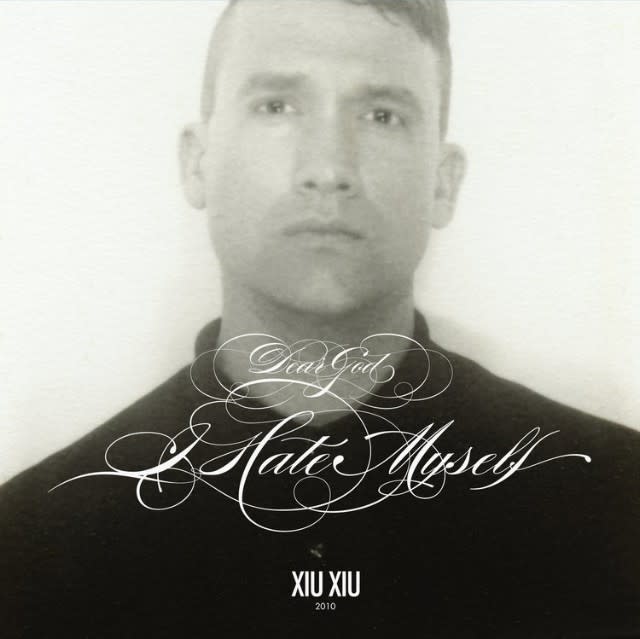
11. Dear God, I Hate Myself (2010)
Xiu Xiu’s 2010 offering exists in a weird limbo. Longtime cohort Caralee McElroy had departed to devote more time to her Cold Cave project, and current collaborator Angela Seo had contributed lyrics and companionship at this point but wasn’t yet a full band member. This left Stewart mostly to his own devices — in this case, apparently, a Nintendo DS on which he arranged several of the songs — and a tremendous dose of self-loathing that may or may not have been tongue-in-cheek. After a decade of making music, Stewart knows what fans want when he sings, “If you expect me to be outrageous, I will be extra outrageous,” but the pay-off on that promise is a cheery song about binging and purging (“Chocolate Makes You Happy”) and an ode to his favorite cartoon characters: Butters from South Park and Sanrio’s Pandapple (“Apple For A Brain”).
That’s not to say Dear God doesn’t address truly disturbing subject matter as well; the chimes and plodding bassline of “Falkland Rd.” relate a stark tale of India’s child sex-trafficking epidemic, and harrowing escape tale “House Sparrow” namechecks schizophrenic serial killer/necrophile Richard Chase. Both songs are surprisingly beautiful given their ugly topics, a juxtaposition Xiu Xiu have handled expertly throughout their career. Album opener “Gray Death” stands out as one of Xiu Xiu’s most arresting tracks overall thanks to Ches Smith’s dramatic timpani, which was (according to Stewart’s drunk commentary on the record, available via Bandcamp) recorded inside a stairwell, giving it a unique echo. While he pounds out a striking rhythm, Stewart unironically sings, “Beat, beat me to death” to brilliant effect. Ultimately, though, the swirl of ideas on Dear God could’ve been reworked for greater impact. Stewart’s song titles are telling; “Hyunhye’s Theme” is dedicated to Seo, while “The Fabrizio Palumbo Retaliation” gives a nod to one of the guys from Larsen. It’s as though Stewart is longing for a full-time collaborator to act as a sounding board, someone who can effectively pull him away from his Gameboy.
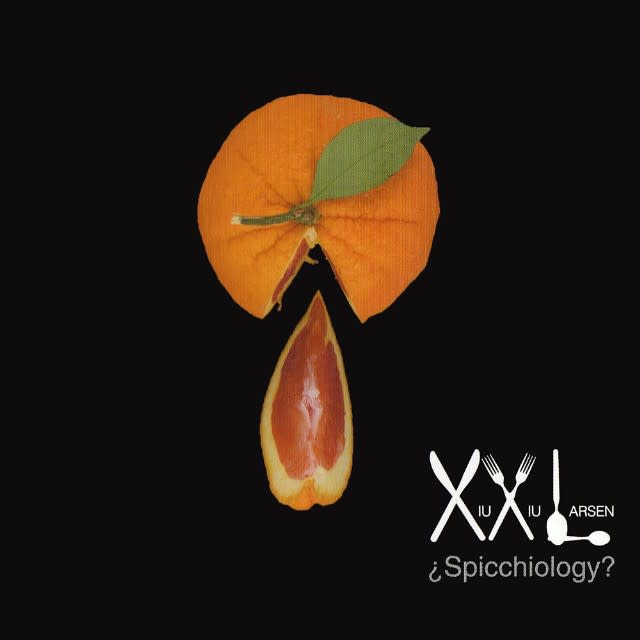
10. ¿Spicchiology (2007)
Everyone needs to hit reset once in a while, and each of Xiu Xiu’s collaborative albums with Larsen provided the band with a creative way to do that. The most successful of the three albums that resulted from these Italian jam sessions is the second, ¿Spicchiology?, which found a healthy ground between the clunky prog-rock of Düde and the contented spaciness of ¡Ciaütistico! by focusing on slightly darker themes. Xiu Xiu really give themselves over to the spirit of Italy here, whether it’s the staticky horror-movie vibes of Goblin and Ennio Morricone on “Daydrinking” or the scorched, malfunctioning harpsichord squall of “The Green Count Tapes” standing in for the weight of European history. But any one of the instrumentals could provide the bones to a great Xiu Xiu song, with “Little Mouse Of The Favelas” (on which Stewart and McElroy sing together) taking top prize for the most fully realized of the bunch. What ¿Spicchiology?, and indeed ¡Ciaütistico! before it, did most effectively is lay the groundwork for the full-band sound that Xiu Xiu would explore in the immediate years following, making their experiences with Larsen truly invaluable to their trajectory.

9. Angel Guts: Red Classroom (2014)
Reviled at the time of its release, Angel Guts got a bad reputation for dialing up the repugnance factor with its nods to racialized sex, incredible violence, unrelenting cruelty, and grotesque imagery. It lacks the pretty moments of relative calm that populated the albums recorded between 2006 and 2013, so that only brutality remains, distilled to perverse verses and, at one point, even pig squeals. That it is reflective of Stewart’s so-called terrifying surroundings after moving to a crime-ridden section of Los Angeles is exceedingly problematic, as is the “erotic” Japanese rape fantasy film the album is named after. Following a relative lull in Xiu Xiu’s discography, the extremes it represents have the effect of a chemical peel, burning off scar tissue and fostering new growth. Angel Guts is Xiu Xiu in a very awkward growth spurt, and often what gets lost when the critique gets stuck on unpacking a song like “Black Dick” is that the percussion and electronic manipulation on the album represent some of the best work Xiu Xiu have done sonically. Moreover, it contributed to a revitalization of the band’s live shows, which now heavily featured Angela Seo’s eccentric contributions at full tilt, backing some of the most deranged vocal performances Stewart has ever given.
In short, this record is seedy as fuck, pulsing with red neon, syrupy fake blood oozing down the walls of a dilapidated sanitarium. “A Knife In The Sun” is a good reference point for where Xiu Xiu were at this point; its malevolent, dirge-like qualities build to explosive wails and drones, the sound of things dying at the end of a sharp blade. It’s not a stretch to say that the industrial sensibilities on display here are directly descended from bands like Swans, with whom Xiu Xiu had spent time touring, developing a close rapport with that band’s controversial frontman, Michael Gira.
Even slightly more hopeful numbers seem decayed around the edges; “New Life Immigration” is about a double suicide, the horror-tinged calypso beat of “Bitter Melon” deals with crushed innocence, and the slowly unfurling “Botanica De Los Angeles” combines the two difficult themes, narrating the death of someone who has suffered tremendous abuse with a thudding beat that hits squarely in the chest. The characters in Angel Guts live in a torturous kind of purgatory, stretched to extremes on a rack of incessant drum machines and creepy organs, and Stewart channels that pain with his hysterics. Much the same as a cerebral slasher flick, there’s something both thrilling and sick about Angel Guts: Red Classroom, though it’s definitely not for the faint of heart.

8. Plays The Music Of Twin Peaks (2016)
In 2015, Xiu Xiu traveled to Australia to perform Angelo Badalamenti’s iconic Twin Peaks soundtrack live at the Queensland Art Gallery during a retrospective of some 200 visual works by David Lynch. Shortly thereafter, the band went into a studio to commit it to tape for a Record Store Day release the following year. Though it must have been daunting to tackle a score so evocative and foreboding, Xiu Xiu were the perfect candidates to do it — not only because of their history of reinterpreting the material of others, but because Xiu Xiu’s work has always exuded a kind of Black Lodge mystique, gliding along in the liminal spaces of the fraying mind, but with the intent to wound.
Plays The Music Of Twin Peaks is, in many ways, the most faithful of Xiu Xiu’s cover projects, but still skews toward weirdness and noise. Stewart sings on only three of these tracks, and yet, even without his vocal as an identifying factor, the instrumentals feel cut specifically from the dissonance and fuzz of Xiu Xiu’s sonic cloth. With Twin Peaks, Lynch hinted at the rotten core of wholesome small-town life — the sex, drugs, death, and betrayal that cast shadows across an otherwise idyllic scene. Badalamenti, in his brilliance, captured both: the sweeping strings and pensive piano representative of the sappy, soap-opera qualities of the show, balanced out by the jazzy noir of mysterious vibraphone and gently brushed percussion. Unsurprisingly, Xiu Xiu present that material in reverse, giving the underbelly a greater weight with crunchy electronic flourishes, clanging gongs, and glassy, lingering reverb on everything else. Their reimagining of Twin Peaks’ soundtrack does something rare within the band’s oeuvre — it introduces space to their typically claustrophobic compositions, like a moody fog rolling through a pine forest. If Badalamenti himself were possessed by the demonic Killer Bob, Xiu Xiu’s soundtrack would most certainly be the result. As concerned as Jamie Stewart has been with documenting the darkest of human impulses, it’s no wonder the project was such a striking success.

7. Women As Lovers (2008)
Long before many musicians cared to examine queer politics or gender identity, Stewart used Xiu Xiu as a forum to interrogate both. It’s been an enduring thread that runs through the band’s catalogue, but on 2008’s Women As Lovers, those themes came to the forefront. In the text of Stewart’s dense, poetic lyrics, women are far from blameless and just as capable as men of cruelty. Inspired by Austrian playwright Elfriede Jelinek, whose work examined gendered power structures and used multiple narrative voices to highlight their absurdity, the album upends the correlation of weakness and nurturing to femininity. Stewart makes these points via his trademark snark and discomfiting overshares, most notably on “Black Keyboard,” his disturbing portrait of matriarchal abuse.
There’s just as much detail in the sonic explorations of this album as there are in the lyrics. On “Master Of The Bump,” Stewart sings over anxious mandolin, “If you note I’m smacking of a savagery/ Know it’s essential to my masculinity/ And if you say my dancing is effeminate/ I will never dance again.” Stewart, who identifies as bisexual, doesn’t seem particularly comfortable with the trappings of either gender, and the awkward guitar solo that follows — normally the hallmark of unabashed cock rock — fizzles out noncommittally. Wonky whistles and mercurial brass punctuate even the album’s poppiest numbers, (“I Do What I Want, When I Want,” “No Friend Oh!”) as well as its noisier critiques of war (“Guantanamo Canto,” “Child At Arms”). Its more ridiculous moments — the close-mic repetition of the phrase “hot pepper, hot pepper” throughout “Puff And Bunny,” or a cover of “Under Pressure” co-starring Swans’ Michael Gira — provide some levity on what amounts to one of Xiu Xiu’s headiest albums. But overall, Women As Lovers is almost academic in its scope; even as Stewart continues to mine his personal life for material, he shows he’s learned to use that to reflect on larger, more universal ideas.
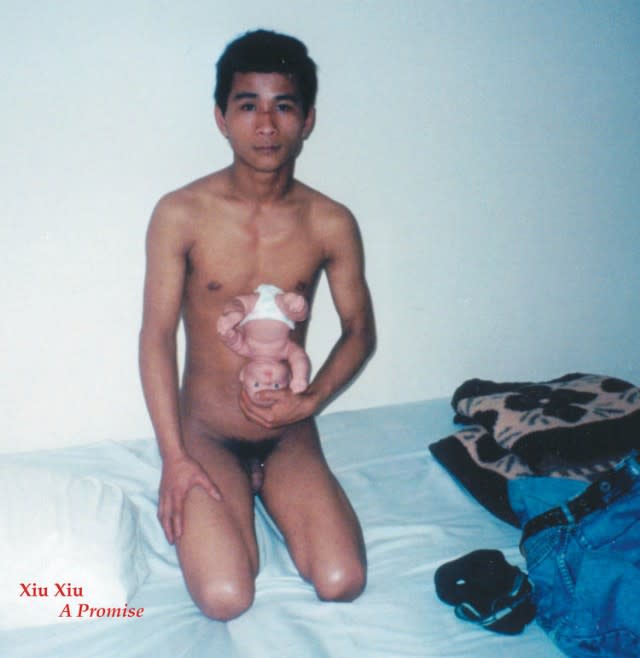
6. A Promise (2003)
If Ten In The Swear Jar represented a sort of big bang, Xiu Xiu formed from the hot gasses and cosmic debris of its explosion. The first few Xiu Xiu albums see the band condense around a center of gravity: the ideas laid out on XITSJ’s only LP, My Very Private Map, released in 1999. A Promise takes one of those fragments, a XITSJ track called “Sad Girl,” and turns it into an overarching theme that gives the band’s second album an arresting narrative thrust. The sad girl isn’t just a muse, but also a facet of Stewart’s capricious sexuality and fluid gender identity. He invokes her with the reworked “Sad Pony Guerilla Girl” (a perennial Xiu Xiu favorite) and he channels her through tracks like the yearning “Sad Redux-O-Grapher,” “Blacks” (“I’ve only got one bra to my name”), “Brooklyn Dodgers” (“I can’t have nice things, like a boy who stays around”), and, ultimately, his aching cover of Tracy Chapman’s “Fast Car.”
Though there are interesting interludes of rewound tape sounds and glitchy electronic elements, the one thing A Promise lacks is compelling percussion. “Sad Pony Guerilla Girl” is devoid of it entirely save for the unmistakable sound of ass cheeks being spanked. The only time drums feel even remotely visceral on the album is during the clanging climax of “Apistat Commander” and the frenzied choruses of “Blacks.” “Brooklyn Dodgers” and “20,000 Deaths For Eidelyn Gonzales, 20,000 Deaths For Jamie Peterson” opt for more diffused drum-machine sound; that same technique in “Pink City” gets submerged in the track’s general cacophony. It almost makes sense given the disposition of the record’s mascot — a wet blanket of a girl, too depressed even to bang on a can until someone notices her plight — but it removes some of the urgency felt elsewhere in the band’s discography.

5. Always (2012)
A decade after their debut, Xiu Xiu had cultivated a community of sorts: fans that rabidly adored their innovative, albeit often challenging, brand of bastardized pop. On the cover of Always is an image of permanent devotion — the album’s title tattooed on Stewart’s brother’s thigh (with more pictures of fans’ tats in the liner notes) — that signified the invitation within, particularly on opening track “Hi,” that if you’re fucked up enough to recognize something meaningful in this music, then you’re automatically part of the club.
But it wasn’t just the encouragement provided by “Hi” to Stewart’s misfit fans that makes the album read as wholly and completely made for them. It was the salacious elaborations on previous Xiu Xiu tracks that built up the world in which their narratives exist, a sort of window into part of the band’s soul that somehow went deeper. There’s the shoegaze-inflected “Joey’s Song,” written for Stewart’s brother, adding to his family mythology. And “Black Drum Machine” reprises the matriarchal incest narrative chillingly addressed on “Black Keyboard,” while “Beauty Towne” elaborates on “Clowne Towne” with more details about the dilapidated punk house where Stewart lived with a number of musicians of a similar ilk, from composer Jherek Bischoff to Mike Hadreas of Perfume Genius, to his bandmates Caralee McElroy and Sam Mickens. Mickens appears elsewhere on the album, too — he has writing credits on piano ballad “The Oldness,” and “Chimney’s Afire” gossips about his attempted suicide while on tour with Xiu Xiu.
There’s also plenty for those who appreciated Xiu Xiu’s political bent: the harrowing story of an Iraqi boy hunted for sport by American soldiers (“Gul Mudin”) rendered in candy-coated pop, a critique of capitalist consumerism and its human casualties (“Factory Girl”), and, of course, the hyped-up declarations of “I Luv Abortion.” There are paeans to depression (“Honeysuckle,” a duet with Angela Seo) and nods to BDSM culture (“Smear The Queen,” with a brilliant vocal guest spot by Carla Bozulich). With full-band panache, Always checks off a virulent index of what the uninitiated should expect from Xiu Xiu. At the same time, it panders to every twisted desire of the band’s most devout followers, the dark honeymoon after a 10-year courtship.

4. La Forêt (2005)
Xiu Xiu’s fifth album arrived at a time when the band was dealing with the emotional fallout from much of what inspired the albums preceding it, and while it is certainly a bit of a juggernaut, it seethes rather than combusts. As part of the process, the band solidified what was compelling about its sound, which resulted in the construction of some of its best songs. “Muppet Face” is a great example of that, its almost joyous musicality tempered by a sudden avalanche of shuddering noise, the clatter of bells executed with vibrators let loose on a xylophone. Stewart’s intonations are almost confessional, then abruptly exultant, a style he revisits on “Bog People.” A droning wail and a galloping autoharp riff build up his vivid laundry list of the specters — a humiliated little girl (his sister), a jar of ash and a headless neck (both representing his father) and a lonely son (himself) — that haunt him until he lets it all go in one desperate question that questions itself: “Why ask? Is there any reason?”
Like the light and dark of a sun-dappled forest, La Forêt loves dabbling in chiaroscuro — there are minimalist acoustic numbers like “Clover,” “Mousey Toy,” and “Dangerous You Shouldn’t Be Here”; the best of these, “Rose Of Sharon” and “Ale,” end with heartrending outbursts from Stewart. Meanwhile, the Shakespearean melodrama of “Pox” benefits from a jagged, almost Radiohead-esque guitar sound, and savage “Saturn,” its violence infamously directed at George W. Bush and inspired by a gory Goya painting, was at that point one of their most frightening songs, certainly indebted to the industrial barrage of a Swans record. The vocabulary — both sonic and lyrical — that La Forêt established signified the many directions the band would take in its subsequent years as it charted new territory, and truly, it can be considered one of the first records where Xiu Xiu struck out unencumbered by a need to revisit material from past projects.

3. FORGET (2017)
Part of what initially motivated Jamie Stewart to begin his 15-year assault on pop music rose from a need to make his inner dysfunction match an outer desire for acceptance in the florid, endless beats of gay dance music. While Xiu Xiu’s drum machines have long been programmed with this effort in mind, even the most club-oriented tracks rarely approached the kind of shimmering possibility in the pulsating lights of a packed dancehall; mostly, the music was bogged down in a pain that made it transcendent for other reasons. But FORGET delivers on that aim wholeheartedly — it even opens with a sample of Banjee Ball callouts. The lyrics of standout early single “Wondering” beckon listeners to a kind of sweaty hopefulness “It is so clear, it is so clean, and unforgivably obscene.” Just after it, there’s something of an apology for Stewart’s more abrasive indulgences (like, perhaps, Angel Guts?) on “Get Up,” a soothing calypso beat reminiscent of “Bitter Melons” driving its melody.
In finally uniting Xiu Xiu’s production superpowers — Greg Saunier, John Congleton, and Angela Seo — the band has found a way to temper the personal turmoil with its closest approximation to catchiness, and it does so without having to eschew out-of-the-box sound collage. The LP’s title track, with its weird jiggling bassline, droning cymbal crashes, grinding synths, and cartoonish vocal interludes, unwinds ironically in a kind of sonic muscle memory, alluding to the essential touchstones of Xiu Xiu’s sound palette. “Petite” is the acoustic foil to it, recalling subtler moments in the band’s oeuvre. It finally offers Stewart’s own curious spirituality as a sort of half-answer to his recurring questions of death and depression (“What God wants,” he gasps, “she does”). After the plodding gothic march of “Faith, Torn Apart,” legendary drag queen Vaginal Davis appears, reading snippets of things Stewart wrote describing women he spotted on notorious cyber-brothel Backpage; it’s hilarious and sad all at once, in the grand tradition of Xiu Xiu’s best work. On FORGET, the band doesn’t have to try too hard to recall the eccentricities that make their output both repugnant and enthralling, because at this point, it’s as ingrained as riding a bike.

2. Knife Play (2002)
As an introduction, Knife Play hints at the violence and despair that would become common themes for Stewart lyrically, as he discloses and documents the most painful events of his lifetime. Sonically, it has an almost explosive kineticism, employing gamelan-inspired rhythms and taking a kitchen-sink approach to instrumentation. The juxtaposition of these elements made for a singular debut that signified Xiu Xiu would be a different beast — not just from Stewart’s earlier musical projects, but from music as a whole.
Its title is a reference to a fetish practice that often hinges on drawing blood. It would certainly not be Stewart’s last time using BDSM or self-harm as lyrical fodder, but the album remains Xiu Xiu’s most complete collection of songs that intertwine sex with the Freudian death drive. The most obvious example of this is “Hives Hives,” with its deliberate reference to AIDS, floating almost nonchalantly over an unapologetically majestic synth line. Then there’s the subtler “Don Diasco,” in which Stewart crosses his heart as well as his wrists with a sigh. Knife Play is nothing if not a document of the work that goes into opening wounds. Sometimes, it’s even touching, as on his delicately rendered portrait of a young transgender girl on “Dr. Troll,” penned long before trans narratives began to make their way into the pop-culture lexicon.
Elsewhere, Stewart strives to makes sense of familial dysfunction: “Suha,” reportedly about his mother, depicts a woman who hates her husband and children; in “Over Over,” someone’s “mixing pills and gas with incest.” Then, of course, the prodigious exclamations that give “I Broke Up” its sensational jolt, the very moment in which it seems Xiu Xiu as a concept were truly born. It feels immediately authentic in spite of its melodramatic intensity, a warning not to be questioned. In its own strange way, the song set a very serious boundary between the confrontational, unflinching Stewart and his future fan base; he would bleed voluntarily, but it came with an all-caps caveat: “DON’T FUCK WITH ME.” The reckoning that his band became would happen on his own terms: ecstatic, revelatory, sometimes grotesque, and most definitely legitimate.
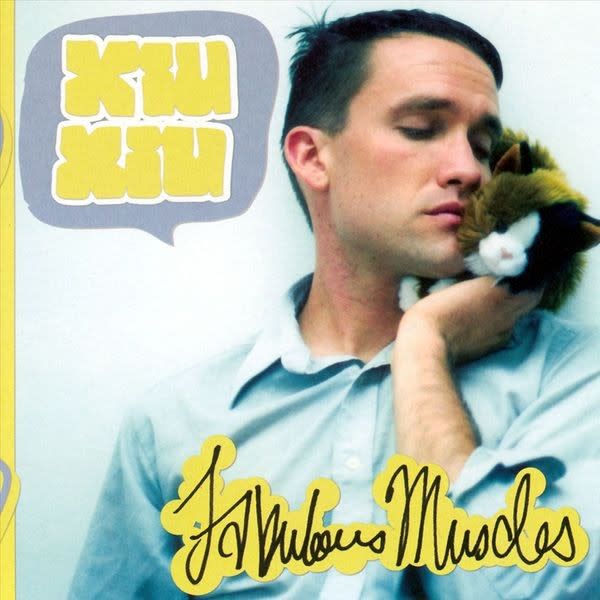
1. Fabulous Muscles (2004)
Both Knife Play and A Promise established Xiu Xiu as a tour de force that paired uncomfortable narratives with melodies alternating between achingly tender and aggressively nonexistent. On the band’s third offering, Jamie Stewart and his cohort applied those principles to the poppiest framework they could muster, and Fabulous Muscles spasmed into being. It was certainly more accessible than its predecessors, but that accessibility was almost a ruse; if the casual burble of “Clowne Towne” or uptempo numbers like “Crank Heart” and “I Luv the Valley OH!” seemed inviting, Stewart’s excoriating critique of American soldiers over screeching feedback on “Support Our Troops OH!” was lurking underneath the surface to disavow anyone of the belief that the album would be an easy listen. Its gently strummed title track, with mentions of deformed penises, broken necks, and lines like “cremate me after you cum on my lips,” was little consolation, but it was nothing if not indelible.
Both of these songs were Stewart’s personal way of interrogating toxic masculinity, a songwriting tactic he would deploy with aplomb throughout his career. Its victims, particularly children, became the haunted characters in that dialogue, as with “Brian The Vampire,” a heart-wrenching tale of incest supposedly based on the true story of one of his former preschool students. Over a supernatural squelch of synths, Stewart both exploits Brian’s narrative and becomes the boy’s only advocate. As we learn later in his tragic letter to his sister’s child, “Nieces Pieces,” it’s a narrative that hits too close to home. And home, it turns out, is the sorest subject of all for Stewart. On “I Luv the Valley OH!” (perhaps Xiu Xiu’s single most enduring and remarkable track), the singer reveals his family’s dire history in screams and fits — one of suicide, threats, and ultimate indifference. “Mike,” written for Stewart’s father, hammers the point home further. It is well known that violent families can perpetuate a cycle of violence, but making music as Xiu Xiu has gone beyond catharsis for Stewart, being the one endeavor that has truly saved him countless times over. Xiu Xiu’s darkness is terrifying, but their journey is exhilarating. The heart is the body’s strongest muscle, and nowhere in Xiu Xiu’s discography does it beat more fabulously.
This post Xiu Xiu Albums From Worst To Best first appeared on Stereogum.


